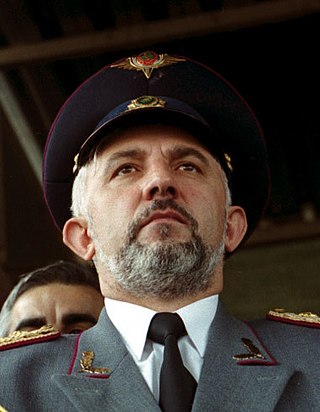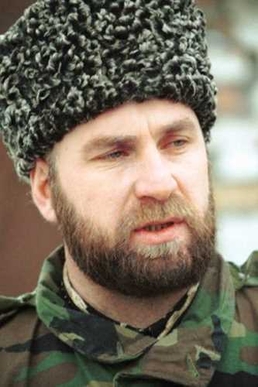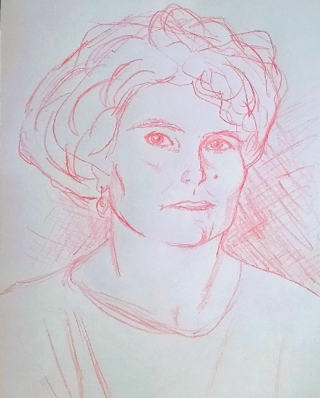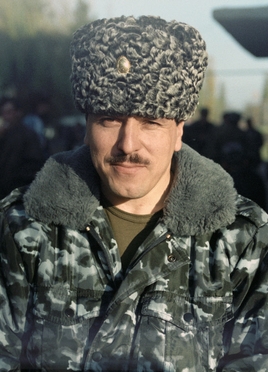
Chechnya, officially the Chechen Republic, is a republic of Russia. It is situated in the North Caucasus of Eastern Europe, between the Caspian Sea and Black Sea. The republic forms a part of the North Caucasian Federal District, and shares land borders with the country of Georgia to its south; with the Russian republics of Dagestan, Ingushetia, and North Ossetia-Alania to its east, north, and west; and with Stavropol Krai to its northwest.

The Second Chechen War took place in Chechnya and the border regions of the North Caucasus between the Russian Federation and the Chechen Republic of Ichkeria, from August 1999 to April 2009.

Akhmad-Khadzhi Abdulkhamidovich Kadyrov was a Russian politician and revolutionary who served as Chief Mufti of the Chechen Republic of Ichkeria in the 1990s during and after the First Chechen War. At the outbreak of the Second Chechen War he switched sides, offering his service to the Russian government, and later became the President of the Chechen Republic from 5 October 2003, having acted as head of administration since July 2000.

Aslan (Khalid) Aliyevich Maskhadov was a Soviet and Chechen politician and military commander who served as the third president of the unrecognized Chechen Republic of Ichkeria.

Shamil Salmanovich Basayev, also known by his kunya "Abu Idris", was a North Caucasian guerilla leader who served as a senior military commander in the breakaway Chechen Republic of Ichkeria. He held the rank of brigadier general in the Armed Forces of Ichkeria, and was posthumously declared generalissimo. As a military commander in the separatist armed forces of Chechnya, one of his most notable battles was the separatist recapture of Grozny in 1996, which he personally planned and commanded together with Aslan Maskhadov. He also masterminded several of the worst terrorist attacks that occurred in Russia.

Zelimkhan Abdulmuslimovich Yandarbiyev was a writer and politician from Chechnya, who served as acting president of the breakaway Chechen Republic of Ichkeria between 1996 and 1997. Yandarbiyev was deemed by UN a suspected associate of Al-Qaida extremist group, and is the first of Chechen leader to be named part of Al-Qaida terrorist network. In 2004, Yandarbiyev was assassinated while in exile in Qatar.
Suleiman Bekmirzayevich Yamadayev was a Chechen rebel commander from the First Chechen War who had switched sides together with his brothers Dzhabrail, Badrudi, Isa and Ruslan in 1999 during the outbreak of the Second Chechen War. He was the commander of the Russian military Special Battalion Vostok unit belonging to the GRU. As such, until 2008, he was officially in command of the biggest pro-Moscow militia outside the control of the current Chechen president Ramzan Kadyrov. From 1 to 22 August 2008 Yamadayev was wanted in Russia on a federal warrant. Nevertheless, he served as one of the Russian military commanders in Russia's war with Georgia during the same period.

Salman Betyrovich Raduyev was a Chechen separatist field commander, from 1994 to 1999, who masterminded and was responsible for the Kizlyar hostage taking raid. His activities, in his role as a commander, made him "Russia's second most wanted man."

On 19 August 2002, a group of Chechen fighters armed with a man-portable air-defense system brought down a Russian Mil Mi-26 helicopter in a minefield, which resulted in the death of 127 Russian soldiers in the greatest loss of life in the history of helicopter aviation. It is also the most deadly aviation disaster ever suffered by the Russian Armed Forces, as well as its worst loss of life in a single day since the 1999 start of the Second Chechen War.

Turpal-Ali Atgeriyev was a deputy prime minister, national security minister of Chechnya.

Ruslan (Khamzat) Germanovich Gelayev was a prominent commander in the Chechen resistance movement against Russia, in which he played a significant, yet controversial, military and political role in the 1990s and early 2000s. Gelayev was commonly viewed as an abrek and a well-respected, ruthless fighter. His operations spread well beyond the borders of Chechnya and even outside the Russian Federation and into Georgia. He was killed while leading a raid into the Russian Republic of Dagestan in 2004.

The Chechen Republic of Ichkeria, known simply as Ichkeria, and also known as Chechnya, is a former de facto state that controlled most of the former Checheno-Ingush ASSR.
The 1999 war in Dagestan, also known as the Dagestan incursions, was an armed conflict that began when the Chechen-based Islamic International Peacekeeping Brigade (IIPB), an Islamist group led by Shamil Basayev, Ibn al-Khattab, Ramzan Akhmadov and Arbi Barayev, invaded the neighboring Russian republic of Dagestan on 7 August 1999, in support of the Shura of Dagestan separatist rebels. The war ended with a major victory for the Russian Federation and Republic of Dagestan and the retreat of the IIPB. The invasion of Dagestan alongside a series of apartment bombings in September 1999 served as the main casus belli for the Second Chechen War.

Arbi Alautdinovich Barayev was a Chechen warlord and terrorist, who in 1996 became the founder and first leader of the Special Purpose Islamic Regiment (SPIR) in Chechnya.

Nadezhda Chaikova was a correspondent for the Russian weekly Obshchaya Gazeta. A colleague of Anna Politkovskaya, she had traveled frequently to Chechnya and neighbouring regions. Near the end of the war, in 1996, she was kidnapped and killed by unidentified gunmen.

Vakha Arsanov was a vice president in the Aslan Maskhadov government of the Chechen Republic of Ichkeria.
The 1998 abduction of foreign engineers took place when four United Kingdom-based specialists were seized by unidentified Chechen gunmen in Grozny, the capital of the unrecognized secessionist Chechen Republic of Ichkeria (ChRI). After more than two months in captivity, all four men were killed by their captors, reportedly following a failed rescue bid. As of 2022, no one has been tried in this case.
Anti-Russian violence in Chechnya refers to acts of violence that were recorded against Russian and non-Chechen civilians in Chechnya from 1991 to 1994, which resulted in tens of thousands of ethnic Russians leaving or being expelled from the republic. Chechen separatists declared independence in 1991 as part of the disintegration of the Soviet Union before the First Chechen War began in 1994.














